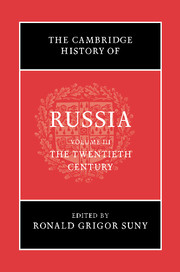Book contents
- Frontmatter
- Introduction
- 1 Reading Russia and the Soviet Union in the twentieth century: how the ‘West’ wrote its history of the USSR
- Part I Russia and the Soviet Union: The Story through Time
- Part II Russia and the Soviet Union: Themes and Trends
- 14 Economic and demographic change: Russia’s age of economic extremes
- 15 Transforming peasants in the twentieth century: dilemmas of Russian, Soviet and post-Soviet development
- 16 Workers and industrialization
- 17 Women and the state
- 18 Non-Russians in the Soviet Union and after
- 19 The western republics: Ukraine, Belarus, Moldova and the Baltics
- 20 Science, technology and modernity
- 21 Culture, 1900–1945
- 22 The politics of culture, 1945–2000
- 23 Comintern and Soviet foreign policy, 1919–1941
- 24 Moscow’s foreign policy, 1945–2000: identities, institutions and interests
- 25 The Soviet Union and the road to communism
- Bibliography
- Index
- References
25 - The Soviet Union and the road to communism
from Part II - Russia and the Soviet Union: Themes and Trends
Published online by Cambridge University Press: 28 March 2008
- Frontmatter
- Introduction
- 1 Reading Russia and the Soviet Union in the twentieth century: how the ‘West’ wrote its history of the USSR
- Part I Russia and the Soviet Union: The Story through Time
- Part II Russia and the Soviet Union: Themes and Trends
- 14 Economic and demographic change: Russia’s age of economic extremes
- 15 Transforming peasants in the twentieth century: dilemmas of Russian, Soviet and post-Soviet development
- 16 Workers and industrialization
- 17 Women and the state
- 18 Non-Russians in the Soviet Union and after
- 19 The western republics: Ukraine, Belarus, Moldova and the Baltics
- 20 Science, technology and modernity
- 21 Culture, 1900–1945
- 22 The politics of culture, 1945–2000
- 23 Comintern and Soviet foreign policy, 1919–1941
- 24 Moscow’s foreign policy, 1945–2000: identities, institutions and interests
- 25 The Soviet Union and the road to communism
- Bibliography
- Index
- References
Summary
The heart of the governing ideology of the Soviet Union was an image of itself as a traveller on the road to communism. This image was embedded in the narrative of class struggle and class mission created by Karl Marx and first embodied in a mass political movement by European Social Democracy. When Russian Social Democrats took power in October 1917, they founded a regime that was unique in its day because of their profound sense that the country had embarked on a journey of radical self-transformation.
Throughout its history, the Soviet Union’s self-definition as a traveller on the road to socialism coloured its political institutions, its economy, its foreign policy and its culture. The inner history of Soviet ideology is thus the story of a metaphor – a history of the changing perceptions of the road to communism. In 1925, Nikolai Bukharin’s book Road to Socialism exuded the confidence of the first generation of Soviet leaders. Sixty years later, the catch-phrase ‘which path leads to the temple?’ reflected the doubts and searching of the perestroika era. Right to the end, Soviet society assumed that there was a path with a temple at the end of it and that society had the duty to travel down that path.
Keywords
- Type
- Chapter
- Information
- The Cambridge History of Russia , pp. 706 - 731Publisher: Cambridge University PressPrint publication year: 2006
References
- 3
- Cited by

